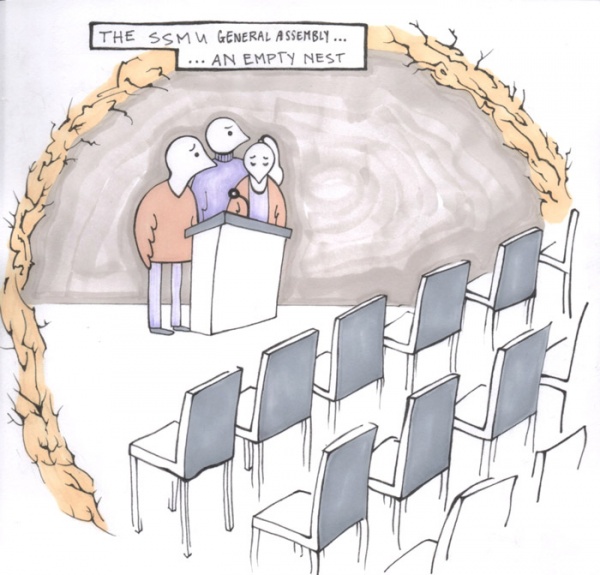The Students’ Society of McGill University (SSMU)’s General Assembly (GA) is defunct. The main forum actively connecting McGill’s student body to its representative council has apparently run its course. The failure of the Fall 2015 GA to reach quorum, and the whopping zero motions submitted, confirms the collapse; however, proposals to address this issue so far lack adequate thought.
Past executive reports have considered either curbing the GA’s frequency to once a year or, more drastically, abolishing it entirely. The latter is particularly troubling as it would drive the wedge between the SSMU and the student body even deeper; rather than blaming student apathy, responsibility lies with SSMU’s neglect of its promotion.
The goals of the GA—namely, to increase transparency and facilitate direct democratic involvement—are laudable. In the past, the GA was the site of heated debate; last year, the Fall and Winter Assemblies attracted lively crowds of 700 and 550 students respectively. Clearly, students are not apathetic. Regardless of what drew the crowd—arguably, such high turnouts were largely a consequence of hot-button issues—the student body was engaged, and the internal operations of SSMU were transparent.
SSMU’s executives, it seems, have come to view the tumbling attendance rates as part of a larger, uncontrollable process: The widespread abandonment of an inherently unproductive forum. This symptom, however, points to a greater issue, which has wrongly been interpreted as an intrinsic, irredeemable flaw in the GA process itself—a fumbling of advertising on the part of SSMU’s executives.
As SSMU President Kareem Ibrahim conceded, the SSMU executive team abandoned promotional efforts for this semester’s GA. Bogged down with a host of pressing internal issues, the executives were unable to provide the GA with the attention it required. The picture painted by this excuse isn’t pretty: So caught up in internal issues, SSMU executives simply had no time to ensure that students would show up to engage in a dialogue. While this could be argued as indicative of a rift between SSMU and the student body, it is precisely the GA—with its implicit demand for student engagement—which possesses the power to bridge such a gap. Rather than reducing its frequency, an emphasis on the GA must be renewed, otherwise SSMU risks further diminishing their legitimacy. While it may be tedious to sit through hours of discourse, students must at least know that they have the option of doing so.
A growing number of McGill students are beginning to view SSMU with ambivalence, to put it mildly. The zeitgeist, it seems, has become increasingly hostile towards what is viewed as an insular, esoteric council of ‘SSMU-tocrats’: An ideologically narrow, self-preserving governing body that emphasizes equity, equity, equity. Such a negative trope impresses upon the student consciousness, which leads to disillusionment with the institution as a whole. While this may partially explain the limited participation at the most recent GA, it neglects the role of the assembly as a forum for checks and balances.
For all the time students spend lamenting the lack of representativeness of SSMU, controversial issues draw the crowds. The absence of motions from the most recent GA is indicative of underlying perceptions of SSMU. While a direct line of causality is difficult to draw, the two are certainly connected. Maybe the GA is defunct, or perhaps no motions were submitted because no issues currently burden the student body’s mind. More likely, however, undergraduates no longer view SSMU as an adequate channel to pursue meaningful reform. It is a classic chicken-and-egg problem. While executives must reprioritize a frequent, well-publicized GA, students can try to meet executives halfway. The student body should oppose a reform that threatens to both curb their clout and reduce the availability of mechanisms for communication.
At a GA, students see their representatives in action: Carrying out their regular procedures and addressing proposed motions with direct student involvement. This interaction, while basic, fosters a tie between the student body and SSMU—thus, the GA must be reinvigorated rather than reduced.










Thank you for this piece on the GA! I agree with many parts of it, although if I may clarify, the Executives didn’t “abandon promotional efforts”, as described – all Councillors were charged with the task of completing a thorough list of promotional tasks to their respective constituencies. You can find this document here: http://bit.ly/1X4Dqky